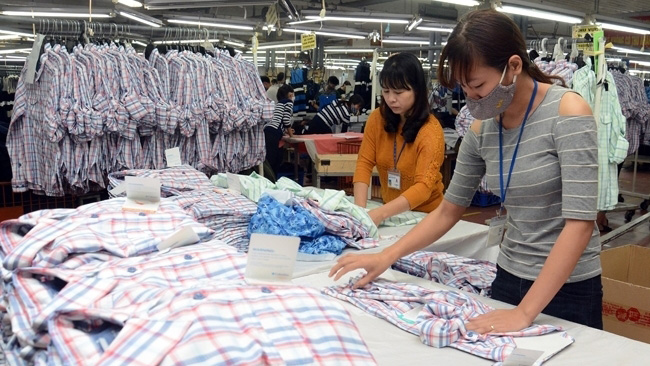


|
Vietnam's garment companies are
likely to be affected by the US-China trade war. Risk of rising global inflation In its latest report on the global economic outlook, the International Monetary Fund kept the global economic growth outlook at 3.9% but stated that growth is becoming less, even between regions and countries. The US economy is projected to strengthen and its growth could reach 2.9% in 2018, with the unemployment rate having now fallen to a record low for decades. Despite solid growth and strong job creation, the US economy is facing the problems of soaring prices and inflation approaching its target. There is no doubt that the US Federal Reserve (Fed) will continue to raise interest rates as part of its monetary policy normalisation. The Fed is expected to make two more rate increases this year and another two in 2019. The move will cause money to flow back to developed economies. Furthermore, the Eurozone is expected to wind down its bond-buying programme, which will also make money flow back to developed countries. As a result, countries with a weak macroeconomic foundation and high political risk will be the first to lose capital. In addition, economic growth in Europe and Japan is forecast to slow down while the BRICS economies, excluding China, will continue to grow faster than previous years but the outlook is less optimistic. China’s trade might fall due to the dispute with the US. The world’s second largest economy is decelerating with its GDP growing by only 6.5%, but there is little risk of it falling into a crisis since China’s room for monetary policy remains large. Low inflation at 1.9%, large foreign reserves at US$3.1 trillion, a positive real interest rate and a high compulsory provision at 15.5% could help China withstand the external shocks. Notably, rising oil prices and sliding currencies are causing prices to increase sharply throughout the world, especially in developing countries. Most of these countries have had to raise interest rates while their stock markets slump. Two of the global economic risks that require attention in the latter half of the year are trade conflicts and the currency war. The currencies of many developing countries such as Argentina, Turkey, India, Brazil and China are losing their values by 10% to 20%. Capital withdrawals from emerging economies also rose strongly in the second quarter of 2018. Many central banks had to tighten their monetary policy. Tax and price hikes should be ruled out Vietnam will face four major impacts from the global economic situation discussed above. The first is the trade balance. The possibility of direct conflict with the US is remote because Vietnam’s trade surplus with the world’s largest economy is quite small. But Vietnam could be indirectly affected by Chinese goods. Many are worried that Chinese goods will disguise themselves as those of Vietnamese origin in order to be eligible for export to the US, which could hurt Vietnam. In fact, the US already imposed tariffs on Chinese steel exported through Vietnam, therefore Vietnam should be cautious and take action to prevent Chinese goods from being exported to Vietnam and later re-exported to the US to avoid punitive measures from the world’s largest economy. In addition, whenever the US-China trade war occurs, the Vietnamese dong tends to strengthen against the Chinese yuan. When the Vietnamese dong is tightly pegged to the US dollar, no matter actively or passively, the Chinese yuan is weakening and a stronger Vietnamese dong will make Vietnamese goods less competitive than Chinese goods. The second impact is that the capital flow into Vietnam might fall, or at best not increase. Countries with a weaker macroeconomic foundation, including Vietnam, will be hit harder. Vietnam’s macroeconomy is far from strong as evidenced by the inflation rate in the first seven months of 2018, which already climbed to 4.5%. The spending deficit has been occurring for years, making Vietnam fail to take advantage of high growth and increasing the burden of tax and fee increases. Hiking taxes will result in price escalation and raise the risk of soaring inflation. When that happens, interest rates will follow suit, undermining the financial market and affecting foreign investment flows. The foundation is not strong because the Vietnamese economy is still reliant on the foreign-invested sector while the private domestic sector has yet to establish a firm footing. The third impact is the pressure on the exchange rate. The anticipation of the Fed’s rate increases will make the US dollar continue to strengthen against other currencies, including the Vietnamese dong. Furthermore, the trade tension between the world’s two largest economies will push the Vietnamese dong to weaken further to make Vietnamese goods more competitive than Chinese goods. Thirdly, Vietnam’s interest rates tend to increase under the pressure of inflation and exchange rate instability, which can also reduce the investment inflow into the country. Vietnam’s growth outlook is a picture of interlaced bright and dark areas. It is necessary to closely watch the factors affecting inflation. This matter depends heavily on the devaluation of the Vietnamese dong in comparison with other currencies and the prices of crude oil, raw materials, as well as the impacts of natural disasters and outbreaks in agriculture at home. In the short term, plans to raise taxes and fees should be ruled out. In addition, it should be prudent when loosening the price regulation of goods and services regulated by the government such as healthcare, education and petrol. If necessary, interest rates could be increased gradually by a small 0.25 percentage points. In the long term, it is still necessary to rigorously restructure public finances, especially lowering the proportion of recurrent spending in total expenditure. The root of tax and fee increases is a fiscal matter. Therefore, fiscal reform must be the primary task. The main measure is to curtail spending along with downsizing the administrative apparatus. Furthermore, greater attention should be paid to removing barriers to businesses and accelerating the equitisation of state-owned enterprises. |